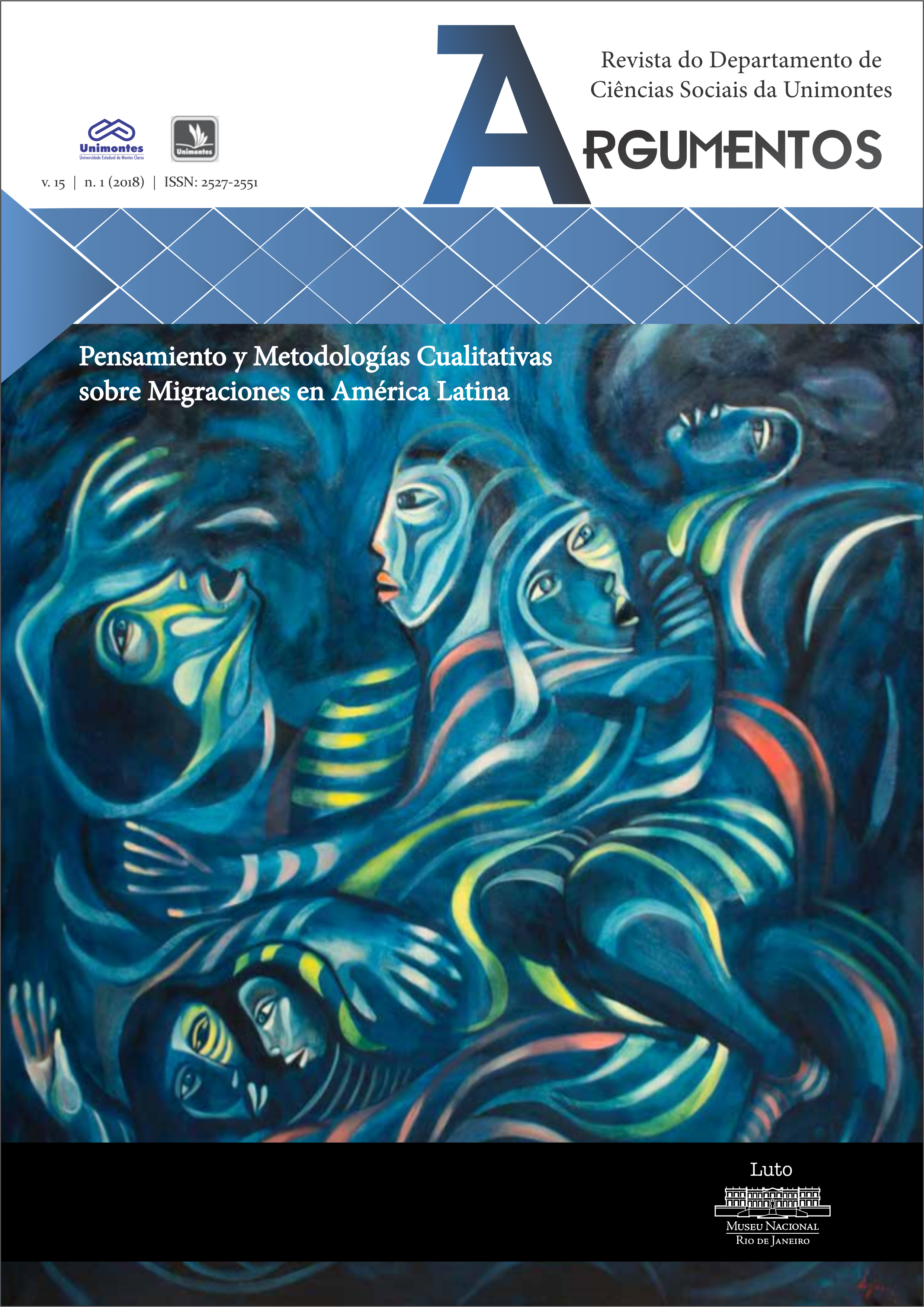“Now it’s your turn!” Identifying positionalities and boundary shifting in ethnographic fieldwork
"Agora é seu turno!" identificando a posicionalidade e as mudanças de fronteiras no trabalho de campo etnográfico
Palavras-chave:
Migration studies; Ethnographic fieldwork; Positional reflexivity; Boundary lensResumo
In the field of migration studies there has been significant debate around the advantages associated with sharing a national or ethnic belonging with research participants. This article joins the recent contributions of female migrant investigators who have opted for what I here refer to as positional reflexivity, questioning the aprioristic conditions of insiderness or outsiderness and advocating for a constant revision of the positionalities and negotiations of power that come into play in the field. I describe the considerations generated by the implementation of this approach in a qualitative study I carried out in the Italian region of Veneto, in which I examined the complex and shifting boundaries that were explicitly mentioned during my encounters with key informants in institutional and associational environments, as well as during interviews with first and second-generation Argentinian migrants. I observe that multiple positionalities such as legal status, university position, national and provincial origin, ethnic origin, migratory generation, gender and age conditioned my interactions with research participants.
Downloads
Referências
ANTHIAS, Floya. Thinking through the lens of translocational positionality: An intersectionality frame for understanding identity and belonging. Translocations: Migration and Social Change, Belfast, v. 4, n. 1, p. 5-20, 2008.
ROVETTA CORTÉS, Ana Irene. Diaspora engagement policies and migrants’ narratives across the Atlantic. In Margueritis, Ana (ed.),Shaping Migration between Europe and Latin America: New Approaches and Challenges, Institute of Latin American Studies, London, 2018.
ROVETTA CORTÉS, Ana Irene. Si me dieran un billete de avión: recurriendo a la elucidación gráfica en entrevistas con menores de edad. EMPIRIA, Revista de metodología de ciencias sociales, vol. 36,2017.
ROVETTA CORTÉS, Ana Irene. Pertenencias danzantes: migración familiar y políticas de retorno. IEPALA, Madrid, 2016.
GLICK SCHILLER, Nina; ÇAĞLAR, Ayşe; GULDBRANDSEN, Thaddeus C. Beyond the ethnic lens: Locality, globality, and born‐again incorporation. American ethnologist, Washington, vol. 33, n. 4, p. 612-633, 2006.
GRAY, Breda. Putting emotion and reflexivity to work in researching migration. Sociology, Manchester, vol. 42, n. 5, p. 935-952, 2008.
GUNARATNAM, Yasmin. Researching 'race' and ethnicity: Methods, knowledge and power. Sage, London, 2003.
LEUNG, Maggi W. H. ‘Talk to her, she is also Chinese’: A Reflection on the spatial-temporal reach of co-ethnicity in migration research. Forum: Qualitative Social Research, Berlin, vol. 16, n. 2, 2015.
MACBETH, Douglas. On ‘reflexivity’ in qualitative research: Two readings, and a third. Qualitative Inquiry, Bradford, vol. 7, n. 1, p. 35–68, 2001.
MANNHEIM, Karl. Essays on the sociology of knowledge. Routledge, London, 1959.
MOROŞANU, Laura. Researching coethnic migrants: Privileges and puzzles of ‘insiderness’. Forum: Qualitative Social Research, Berlin, vol. 16, n. 2, 2015.
NOWICKA, Magdalena; RYAN, Louise. Beyond insiders and outsiders in migration research: Rejecting a priori commonalities. Introduction to the FQS thematic section on ‘Researcher, migrant, woman: Methodological implications of multiple positionalities in migration studies’. Forum: Qualitative Social Research, Berlin, vol. 16, n. 2, 2015.
PILLOW, Wanda. Confession, catharsis or cure? Rethinking the uses of reflexivity as methodological power in qualitative research. Qualitative Studies in Education, Indianapolis, vol. 16, n. 2, p. 175-196, 2003.
ROSE, Gillian. Situating knowledges: Positionality, reflexivities and other tactics. Progress in Human Geography, Manchester, vol. 21, n. 3, p. 305-320, 1997.
RYAN, Louise. ‘Inside’ and ‘outside’ of what or where? Researching migration through multi-positionalities. Forum: Qualitative Social Research, Berlin, vol. 16, n. 2, 2015.
SHINOZAKI, Kyoko. Transnational dynamics in researching migrants: Self-reflexivity and boundary-drawing in fieldwork, Ethnic and Racial Studies, Guildford, vol. 35, n. 10, p. 1810-1827, 2012.
WIMMER, Andreas; and GLICK SCHILLER, Nina. Methodological nationalism and beyond: Nation-state building, migration and the social sciences. Global Networks, Oxford, vol. 2, n. 4, p. 301-334, 2002.
WYLIE, Alison; POTTER, Elisabeth; BAUCHSPIES, Wenda K. Feminist perspectives on science. In ZALTA, Edward N. (ed.), The Stanford Encyclopedia of Philosophy, Stanford University, Stanford, 2010.
YUVAL-DAVIS, Nira. The politics of belonging: Intersectional contestations. Sage, Londres, 2011.







.png)










.png)





